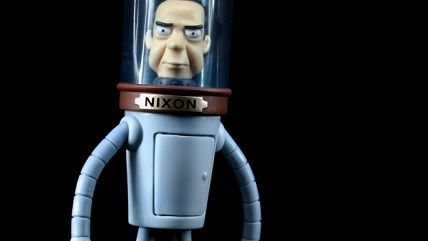Let's Celebrate Watergate and the Deflation of the Imperial Presidency
It wasn't a national nightmare; it was fun. We can do it again.

Forty years ago, President Richard Nixon, backed into a corner by the Supreme Court, surrendered Watergate's "smoking gun" tape. Recorded six days after the break-in at Democratic National Committee headquarters, it revealed the president scheming to get the CIA to quash the investigation — making it clear that he was in on the cover-up from the start.
Nixon announced he would resign three days later, and on Friday, Aug. 9 — after a cringe-inducing double V-for-Victory salute from the South Lawn — it was: So long, don't let the helicopter door hit you on the way out.
That afternoon, a newly sworn-in President Gerald Ford bemoaned "the internal wounds of Watergate, more painful and more poisonous than those of foreign wars." Given 22,000 American casualties in Vietnam under Nixon, it seemed an oafish comparison at best. Still, Ford's point was, "Our long national nightmare is over."
"Nightmare"? Lighten up, Jerry. The revelers who gathered in Lafayette Park had the right attitude: They stuck a sign on the White House fence reading, "Ding dong, the witch is dead."
"I'll tell you what I remember most about Watergate," journalist Jeff Greenfield enthused 10 years later: "It was fun."
Four decades on, it's clearer than ever that Aug. 9, 1974 — when Americans finally dethroned an imperial president, and began reining in the imperial presidency — is a day worth celebrating.
The Nixon tapes revealed much more than the cover-up of a "two-bit burglary." Nixon's "plumbers" broke into a psychiatrist's office, looking for dirt on Pentagon whistleblower Daniel Ellsberg — and even considered a diversionary firebombing of the Brookings Institution that would let them steal Brookings' files.
But Nixon was so irresistibly hate-able, it's easy to forget that, as constitutional scholar Philip Kurland put it in 1978, "The primary evil revealed by the events of Watergate was the presidency: not the man but the office. It was and is bloated with unrestrained power."
Indeed, many of the charges contained in Nixon's articles of impeachment — criminal misuse of the CIA, IRS, and FBI, for example — were business as usual for his predecessors. John F. Kennedy had his CIA director wiretap members of the Washington press corps; Lyndon Johnson had the agency bug Barry Goldwater's campaign plane. Kennedy's Ideological Organizations Project at the IRS made Lois Lerner look like an amateur. And, as Americans learned from the mid-1970s special committee investigation of intelligence abuses led by Sen. Frank Church, D-Idaho, nearly every post-World War II president used FBI wiretaps to keep tabs on political opponents.
As Chris Hayes recounted in 2006, "Church and many Democrats had every reason to believe they would be chiefly unmasking the full depths of Nixon's perfidy," but soon discovered that presidents of both parties enjoyed "using the available federal machinery to screw [their] political enemies."
The Church committee's revelations spurred reforms designed to check executive lawlessness. In the years since, those reforms have been dangerously undermined, and we still hear presidents echo Nixon's infamous statement that "when the president does it, that means it is not illegal."
One thing we don't hear anymore, however, is a phrase Nixon's chief of staff uttered, in all seriousness, during a discussion about the release of the Pentagon Papers: "The implicit infallibility of presidents, which has been an accepted thing in America, is badly hurt by this."
"The implicit infallibility of presidents." Try saying that out loud without smirking. In the wake of Watergate, presidential "infallibility" is no longer an "accepted thing" — it's something that's impossible to contemplate with a straight face.
In that much-maligned era, Americans rediscovered their historic skepticism toward power, and, for a time, brought the presidency down to size. We didn't finish the job, but what we achieved 40 years ago suggests that we can do it again.
This column originally appeared in The Washington Examiner.


Show Comments (61)